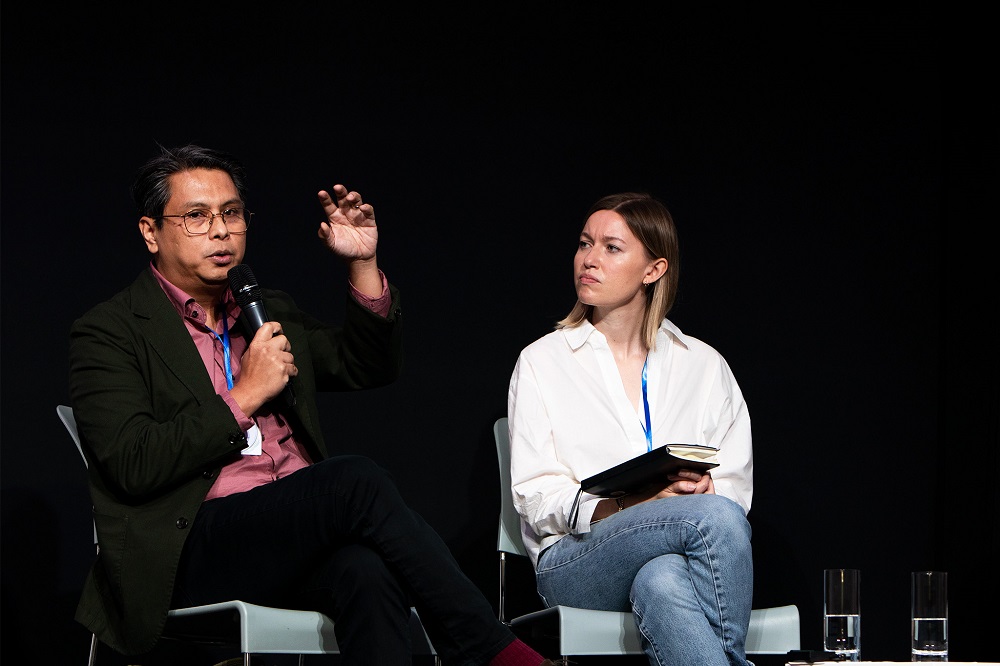The most successful podcasts break down the boundaries between local news and global affairs and bring listeners closer to the journalism process itself, three experts in the format explained at IPI’s 2023 World Congress and Media Innovation Festival.
“People come [to podcasts] for a deeper understanding of the story and to engage with our journalists. You are in the audience’s ears and they’re hearing you make your mind up, hearing the process of journalism happen in real time”, explained Basia Cummings, editor and partner at Tortoise Media in the UK.
Tortoise is an audio-first newsroom where podcasts are a key revenue driver, but it only pivoted to audio after the small team realized they needed to carve out a niche in the competitive world of long-form investigations. Audio turned out to be a good fit for the organization’s mantra of slow journalism, allowing the team to be open and show how they work to their audience.
All three newsrooms represented on the panel – Tortoise Media, Outriders, and PumaPodcast – produce a range of audio products, including regular news updates but also limited series. These narrative podcasts tend to either dive deep into a localized story and use this to explore global themes and issues, or take a newsworthy topic and cover the local angle – always featuring characters that listeners can relate to and feel closer to through the podcast and highlighting that any divide between local and global news is often artificial.
Outriders’ series Into the Wasteland is a clear example of this approach. It covered the story of illegal waste from England which is exported to different parts of the world, and the impact it has on the communities where it ends up, through collaborations with local journalists.
In a different way, PumaPodcast achieved this with Catch Me If You Can, a series on disinformation in the run-up to last year’s Philippine elections, which led to a sharp increase in listeners from around the world. The team saw the potential for cross-border impact from the start, due to global interest in the Philippine election as a “petri dish” for analyzing how disinformation can impact politics.
Roby Alampay, chairman and executive editor, said that “people fall in love with the humanity of podcasts”. One decision which helped them maximize the potential of this project was the partnership with an academic, disinformation expert Jonathan Ong, who worked together with a reporter on the programme.
By allowing Ong to lead the conversations, they achieved results that would not have been possible with the journalists working alone, including getting one of the country’s most notorious online trolls to speak on the record.
Scaling up and making audio pay
Diversified revenue models are strong revenue models, and that’s as true for podcasts as any other format. As their reach has grown, PumaPodcast and Tortoise have worked on audience segmentation to find ways of generating revenue from different groups within their listeners.
Both newsrooms have introduced ways for listeners to make paid contributions, targeting those who are only interested in certain series. Tortoise took advantage of the addictive nature of podcasts to introduce a “windowing” strategy making episodes available earlier for paying listeners, and introducing a new “supporter” tier, while retaining membership for those who want deeper participation. At PumaPodcast the introduction of a “tip jar” exceeded its initial (small) target by eight times.
Alampay’s team has also generated revenue by producing podcasts for other organizations, something they were able to do because of a clear strategy to focus on high production levels at an early stage.
Journalists are turning to podcasts to tell their stories. How? And can it scale?
👉Czyli dziś w Wiedniu na #IPIWoCo 2023 i #MediaInnovation Festival!
🔴Live: https://t.co/BNLyx7n8yF pic.twitter.com/qpLvFme6PK— Outriders (@outrid3rs) May 25, 2023
Zuzanna Olejniczak, producer for Outriders in Poland, recommended focusing on your team’s knowledge of the audience and what works when choosing which projects to prioritize.
“I wouldn’t say there is [such a thing as] ‘premium content’; it’s more about understanding your audience and developing the things you’ve done where you’ve seen already that people’s interest was high,” she said.
While the panellists agreed there is no single path to profitable podcasting at scale, they were optimistic that consumers are increasingly willing to pay for quality journalism and the personal nature of podcasts. To capitalize on this, they recommended producing engaging and creative journalism that reflects the newsroom’s values and knowledge of audience needs.



